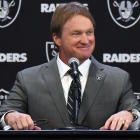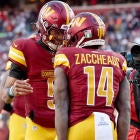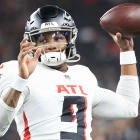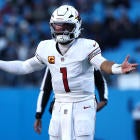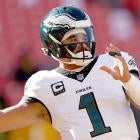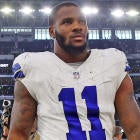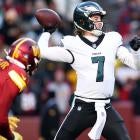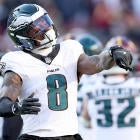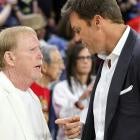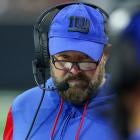It's been only 10 weeks, but consider Jon Gruden's honeymoon phase officially over in Oakland. After a hyped introduction that felt more like a coronation, Gruden's first offseason back in charge of the Raiders has gotten off to a questionable at best start.
He began by denouncing the use of analytics (also known as having more information) while announcing his desire to "throw the game back to 1998." It's too easy to read too far into one comment, run with it, and turn it into a bigger issue than it actually is (says the blogger), but then again, take a look at the major offseason moves the Raiders have made in the short chunk of time Gruden has been at the helm and, well, there's a joke to be made about Gruden actually believing it's the year 1998 rather than 2018.
Instead of addressing their most pressing issue (their very bad defense), the Raiders haven't yet made any defensive moves that inspire much confidence. Instead of getting $125 million quarterback Derek Carr the help he requires, they've opted to bolster the offense by focusing on the running game and providing Carr with a downgrade at wide receiver. Instead of building for the future by signing young players with potential, they've opted to sign older veterans who are past their primes. Quite frankly, the majority of the moves the Raiders have made in the week since the legal tampering period of free agency began create more questions than solutions.
We begin with the addition of wide receiver Jordy Nelson. When Nelson was surprisingly cut by the Packers, the Raiders immediately zeroed in on him as their target. Carr met him at the airport (it's across the street from the team facility) before they presumably ate lunch with owner Mark Davis at P.F. Changs (not really). Not much later, Nelson signed a two-year, $15 million deal with $13 million guaranteed (really). To make room for him, the Raiders cut receiver Michael Crabtree, who has since landed in Baltimore with a Ravens team that was so desperate to acquire him, they found a way to get out of the deal they had made with Ryan Grant (I'm joking ... probably).
Three or four years ago, replacing Crabtree with Nelson would've been a upgrade. Not anymore. Crabtree will turn 31 in September. Nelson will turn 33 in May. That might not seem like much, but in football years, it's substantial, especially after factoring in Nelson's injury history. Since Nelson's torn ACL in the summer of 2015, he hasn't been the same receiver. As our Pete Prisco likes to say, besides "please get off my lawn," Nelson can't run anymore.
Jordy Nelson can't run anymore
— Pete Prisco (@PriscoCBS) March 13, 2018
That's important because Nelson is joining a team that has a quarterback who likes getting the ball out as quickly as possible before pressure can even begin to form. Can Nelson get open quickly anymore?
Nelson's decline was especially evident this past season, when he caught 53 passes for 482 yards and six touchdowns in 15 games. He averaged 9.1 yards per reception, which was the 103rd highest average in football. ESPN's Bill Barnwell puts that figure into context:
Overall, Nelson's yards per catch fell by 3.9 yards, from 13.0 in 2016 to 9.1 last season. That's a worrisome fall. In looking at receivers in their 30s who caught 50 passes in consecutive seasons, Nelson had the fourth-largest drop-off in yards per catch of any wideout since 1970.
According to Pro Football Focus, Nelson posted a 72.6 wide receiver rating last season, which means the Packers' quarterbacks accumulated a 72.6 passer rating when targeting Nelson. Only two qualified receivers posted a lower receiver rating than Nelson, who ranked 43rd out of 45 qualified receivers in that metric. He was dreadful downfield, catching only 20 percent of his targets 20-plus yards downfield -- a catch-rate that ranked 49th out of 59 receivers, per PFF.
If you were to look at his receiving map without knowing it was his, you'd think it belonged to a receiver on the 2017 Bears or Ravens.

Obviously, the fact that Nelson had to catch passes from Brett Hundley -- not Aaron Rodgers -- played a role in his demise. But don't just blame Hundley for Nelson's struggles. It's on Nelson too, who also struggled when Rodgers was healthy, which Barnwell also explained:
Through his first five games last season, Nelson produced 19 catches for 210 yards and a whopping six touchdowns, which was an unsustainable ratio. Given that Nelson missed most of the Falcons game in Week 2, he was averaging 57.5 receiving yards per contest, down from 94.9 yards per game in 2014 and 78.6 yards per game in 2016 after coming back from his torn ACL.
What makes the move worse is that the Raiders gave up on a quality receiver in Crabtree to make room for Nelson. Like Nelson, Crabtree is coming off a down year that was party due to deteriorating quarterback play. In 14 games, he caught 58 passes for 618 yards (10.7 yards per catch) and eight touchdowns as the Raiders' offense as a whole floundered. But he's better at this point in their careers -- and that's without even taking health and age into consideration. Crabtree caught only 25 percent of his deep targets this past season, but that's five percent more than Nelson did. He posted a 95.4 receiver rating, which isn't great, but it is 22.8 points better than Nelson's rating.
Nelson's hands are still reliable (he rarely drops passes) and he's capable of hauling in contested catches in tight coverage, which will aid the Raiders' offense in the red zone (five of his six touchdowns came inside the 10-yard line). And hey, maybe there is a chance he rediscovers his Pro Bowl form. It's not impossible. But a 6-10 team like the Raiders shouldn't be in the market for a soon-to-be 33-year old receiver who can't separate from defensive backs anymore. It's not a move that'll help the Raiders win a championship.
They went 6-10 a year ago, getting outscored by 72 points along the way. They're not a player away from competing for a championship. I know they won 12 games in 2016 and finally broke their playoff drought, but they weren't nearly as good as their record indicated. Their point differential that season? Plus-31, which put their expected win total at 8.7-7.3, according to Pro Football Reference. The Raiders shouldn't be in the market for any 33-year-old, past-his-prime players. They should be buying upside, players who are on the upslope of their career. They're not good enough -- or close enough to a championship -- not to be doing that. The most likely scenario sees Nelson leaving the Raiders before they're ready to challenge for the Super Bowl.
Which brings us to Doug Martin, who isn't 33, but also isn't a young, entering-his-prime player. The Raiders decided to sign him to back up Marshawn Lynch in their backfield. That means the Raiders will enter the season with a 32-year-old starting running back and a 29-year-old backup.
Gruden, who wasn't the one who traded for Lynch a year ago, shouldn't be faulted for wanting to bring back Lynch, who rolled in his final 10 games of the season, when he totaled 697 rushing yards and five rushing touchdowns while averaging 4.65 yards per carry. His final stat line might've been disappointing -- 891 rushing yards (4.3 YPC) and seven touchdowns in 15 games -- but keep in mind he also posted the fourth-best elusive rating among running backs by creating 50 missed tackles, per PFF. There's reason to believe that with the rust knocked off, he's ready to go full Beast Mode from the get-go next season.
Gruden should be blamed, however, for the unnecessary addition of Martin. NFL Network's Ian Rapoport reported that the signing happened after Martin impressed Gruden in a meeting, which is the only place Martin can impress coaches anymore. It's been two full seasons since Martin's 1,402-yard campaign in 2015. Since then, Martin has totaled 827 rushing yards and six rushing touchdowns. More alarmingly, he's averaging 2.9 yards per carry in the past two seasons. The good news is that Martin signed a one-year deal that'll likely be cheap, so the Raiders aren't investing much in Martin. It's a low-risk move, but one that is unlikely to pay off. In short, it feels unnecessary. The Raiders could be trying to get younger at the position to plan for life after Beast Mode. Instead, they now have two older players on one-year deals to spearhead their backfield.
What's concerning about the Martin and Nelson moves is that those who criticized the Raiders for hiring a coach who's been out of football for a decade appear to have been at least partly right in their prediction that Gruden's time away from football might end up being detrimental to the Raiders. This is where the jokes about Gruden thinking it's 1998 (or 2008, the last season he coached) come into play.
yeah but they were all still young the last time Gruden coached so they’re still fresh
— Tom Fornelli (@TomFornelli) March 17, 2018
In addition to the signing of Martin, the Raiders signed two blocking tight ends in Lee Smith, 30, and Derek Carrier, 27, which seem to signal Gruden's desire to move the game back to 1998 by adopting a run-heavy approach. Both are on the roster at the same time.
#Raiders TE Derek Carrier was used as a run blocker on 73.68% of his offensive snaps in Sean McVay's offense with the Los Angeles Rams in 2017. He ran routes just 21.58% of the time.
— Austin Gayle (@AustinGayle_PFF) March 13, 2018
He's surely stepping into Lee Smith's shoes as OAK's primary blocking TE in 2018.
They then signed a fullback in Keith Smith (25), for whom Gruden has "big plans" even though the league has shifted away from one-dimensional players. That's not knock on Smith; it's a knock on the position he plays. While the rest of the league transitions to using more versatile offensive players who can spread out defenses and create mismatches, Gruden wants to use his fullback in the name of good old-fashioned smashmouth football.
"I feel like we are going to run the rock," Smith said, per The San Francisco Chronicle. "Jon Gruden is old school. So he's going to try to play that smashmouth football."
Blocking matters and an improved rushing attack should help Carr. And who knows, maybe Nelson's locker-room presence will be enough to push the Raiders over the edge. Maybe Martin will undergo a career renaissance. Strange things happen in sports.
But the Raiders probably should've been spending the offseason trying to surround Carr with better pieces that the ones they've brought in, because it's clear he's not good enough to be left to his own devices. They're paying him $25 million next season and they just saw what happens when his supporting cast isn't there to elevate him: His passer rating dropped 10.3 points this past season. They shouldn't be trying to minimize his impact by running the ball a gazillion times a game. You don't give a player that kind of contract and then try to hide him.
It's concerning that the moves we're talking about a week after the onset of free agency are the Raiders swapping out a productive, aging receiver for a less productive older receiver, signing an aging unproductive running back, and adding three players who can't contribute in the passing game. The moves we should've been talking about were moves that addressed their biggest need: defense, which is a problem that Gruden inherited rather than built.
To this point, they've signed cornerback Rashaan Melvin, linebacker Tahir Whitehead, safety Marcus Gilchrist, linebacker Kyle Wilber, and defensive end Tank Carradine. The Melvin signing (a one-year, $6.5 million deal, per ESPN's Adam Schefter) has a chance to be a sneaky great one after Melvin notched three picks in 10 games last season on a bad Colts defense while allowing a 60.3 passer rating in coverage (11th lowest among qualified cornerbacks), according to PFF. But most of those players are complimentary pieces, not focal points. At some point, the Raiders need to get Khalil Mack the help he needs.
No, that isn't Andrew DePaola's new job, though he's certainly being well paid for the job he just got hired to do.
Former Bears’ long snapper Andrew DePaola signed a 4-year, $4.27 million deal with the Raiders that includes $875K gtd,!making him highest paid LS, per @seanstellato.
— Adam Schefter (@AdamSchefter) March 16, 2018
So, here's the thing: It's mid-March. It'd be dumb to panic now or write off the Raiders entirely.
Free agency isn't over yet. There are rumblings that the Raiders could be trying to trade for the talented, but oft-suspended Vontaze Burfict, who would provide them with a huge upgrade at an area of need in terms of strictly football. When I first sat down to start writing this, news broke of a trade that sent special teams ace Cordarrelle Patterson to New England in exchange for a better late-round draft pick. On Tuesday, ESPN's Adam Schefter reported that defensive tackle Ndamukong Suh will visit Oakland on Wednesday. Suh would be an amazing addition because he's still one of the game's best players.
Clearly, Gruden's not done reshaping a roster riddled with holes, which again, he inherited and shouldn't be blamed for.
Still grinding.#RaiderNation pic.twitter.com/3IbZjV4AwA
— OAKLAND RAIDERS (@RAIDERS) March 16, 2018
The draft, where the Raiders sit at No. 10 barring a trade up or down, will provide them with a chance to bolster the defense, especially considering it looks like as many as four quarterbacks could be off the board before the Raiders are on the clock. So many of us here at CBS Sports have spent the last month mocking inside linebacker Roquan Smith to the Raiders, which seems like a perfect fit.
Furthermore, if Gruden is everything he's made out to be, his play-calling alone should help turn around an offense that underachieved. And if that happens then all bets are off. We see every season how important coaching is when the Patriots decimate the rest of the AFC. We saw it again this past season when Doug Pederson coached the shorthanded, creative, and aggressive Eagles to a championship win over the Patriots. Coaching matters.
The point being, it's early. All of this was just a long-winded version of saying, the Raiders' first few personnel moves aren't slam-dunk, home-run (I'm one sports metaphor away from the triple crown ... oh wait) signings and as a result, plenty of questions still exist in Oakland. Which is fine. The only problem is, when a coach is given a 10-year, $100 million contract, fine isn't really fine.









